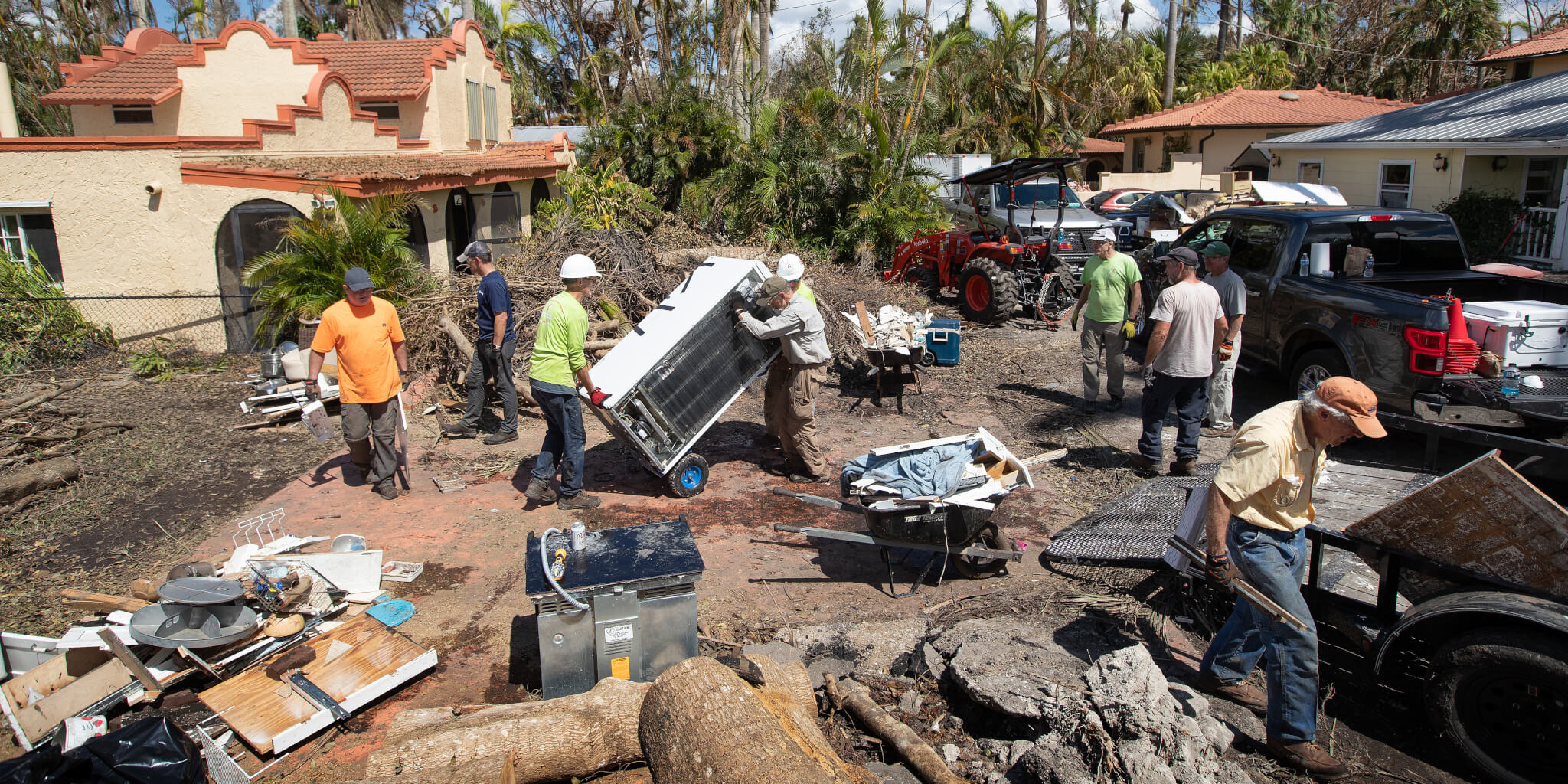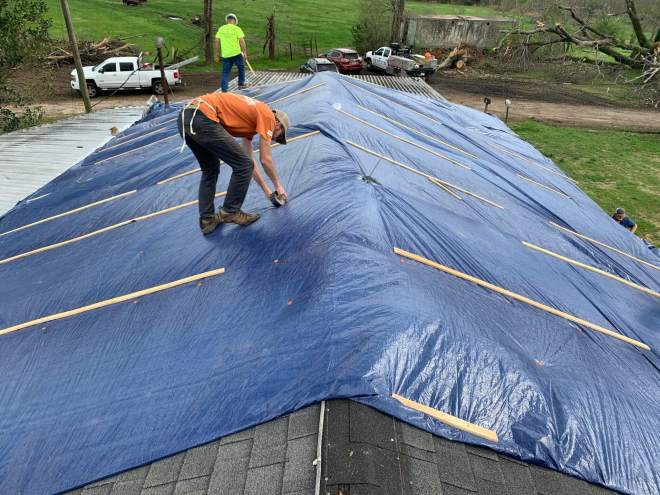In Alabama and Florida, UMCOR provides both immediate and long-term disaster response

Members of a volunteer team from the North Georgia Conference of The United Methodist Church clear storm debris and damaged kitchen items from a home that was flooded by Hurricane Ian in Fort Myers, FL. PHOTO: MIKE DUBOSE, UM NEWS
By Christie House and Dan Curran
In March 2021, a storm system surged into Alabama that spawned 11 tornadoes. Several of these were categorized as EF-3 tornadoes, with winds gusting up to 165 mph. One traveled 80 miles across four counties.
Nine months after the tornadoes struck, some of these communities were still unable to provide the necessary resources for recovery. Some of the rural residents most affected would wait for help that never came.
In December 2021, the Alabama-West Florida Conference received a $582,900 grant from the United Methodist Committee on Relief (UMCOR) to provide case management and construction services to support storm survivors in the four counties. That long-term recovery work continues in 2022.
A firm partnership
The AWF-UMCOR partnership first took shape in 2018 after Hurricane Michael swept across a narrow band of the Florida panhandle, leaving major destruction in its wake. UMCOR delivered grants totaling nearly $5 million for a 2-year recovery program, which included disaster case management, volunteer management, construction coordination and building repairs. It helped 275 households recover from the hurricane, repaired 200 houses and built 43 new houses from the ground up.
The Rev. Chris Ackerman, whose family was one of those in the Florida panhandle that suffered major property damage, was hired as the project director while serving as the associate pastor at Lynn Haven United Methodist Church. Today he serves the conference as a pastor and as the Conference Disaster Response Coordinator.
Two years after Michael, hurricanes Sally and Zeta struck Alabama in September and October 2020. That recovery program, funded in part by UMCOR, is still underway. Since case managers were already trained and working for Michael recovery, the conference was able to move quickly to fill the gap in another area that wasn’t receiving enough assistance. This project’s goal was to assist 37 families that sustained heavy damage. So far, they’ve exceeded their goal.

By the time the four-county tornado stuck six months later, AWF disaster response was experienced and fully capable of taking on that disaster too. They discovered that 20-30 of the homes that suffered damage were owned by people with no home-insurance, so those are receiving construction help. The latest UMCOR grant continued case management services.
A new church start centered on making a difference
As a pastor and a disaster response manager, Ackerman started thinking about his journey with disaster response ministry over the last couple years.
“I’ve always been passionate about the church living out its faith in tangible ways,” he said. “When I saw the effects of ministering alongside people after Hurricane Michael, I decided it was clearly one of the most Jesus-like things we could do. This is where the idea for a church plant focused on disaster as its mission was born.
“When I approached the district superintendent and conference office with this idea, they expressed their full support. As a result, Bishop David Graves appointed me as pastor of a new church start in Panama City, Florida, which we named Abide Community.”
The congregation members strive to be disaster ready. The church staff includes a case manager, a construction coordinator and an operations director. They maintain disaster relief equipment and offer training. “We’re creating a community of people who are focused on discipleship, market-place ministry, and disaster response and recovery. That mission is the heartbeat of the church,” Ackerman said.
“Ideally, we want to be able to help fund future disaster recovery in our conference. UMCOR has been amazing support for us in all our disaster response and recovery efforts, and we want to make sure that we honor the work that UMCOR does by doing our part in being able to do effective disaster response ministry.”
Hurricane Ian response in Florida
On Sept. 28, 2022, Hurricane Ian made landfall in Florida with winds of 150 mph, which tied as the fifth-strongest hurricane on record to strike the United States. The strong winds, rain and punishing 18-foot storm surge caused severe flooding, demolished homes and businesses, and caused more than 100 deaths.
Prior to the hurricane’s arrival, UMCOR and its local partners used a preemptive approach to storm response and recovery. Staff were in close contact with conference disaster response coordinators in states where an impact was expected and helped them plan their response.
The Florida Annual Conference received a solidarity grant from UMCOR to address the immediate needs of survivors and deploy supplies. And as Ian continued to move up the East Coast, UMCOR was there for even more local partners with support. Ian was the first hurricane to make landfall in South Carolina in nearly six years, and UMCOR awarded a solidarity grant to the conference to help address immediate needs.
Global Ministries’ Environmental Sustainability program, in partnership with UMCOR and the Footprint Project, had already planned a training event in Florida on how to build, install and operate solar-powered generators when Hurricane Ian struck.
Volunteers from the Florida and North Carolina conferences were able to quickly put their newfound skills to use by setting up two solar-powered microgrids in hard-hit communities along Florida’s Gulf Coast. The generators helped survivors communicate, work, store medicine and operate medical equipment in the middle of the destruction caused by Hurricane Ian.
UMCOR continues its work with conference disaster response coordinators and conference leadership to determine next steps. In Florida, an UMCOR consultant has been assigned to provide assistance with planning and logistics and a program manager has started working on the development of a short-term relief grant while a long-term recovery program is developed. In South Carolina, UMCOR will assist with the development of long-term recovery grants.
As each hurricane season brings new and increasingly devastating storms to the southeastern U.S., UMCOR’s legacy of being “early in, last out” is embodied. United Methodists are there to accompany recovering communities for many years after a storm hits. This is made possible because of UMCOR’s model of constant preparedness and readiness as well as the strong bonds of partnership that UMCOR forms and sustains.
“Our conference partners seek opportunities to serve communities that lack the resources to recover, fully utilizing their UMCOR training and experience, staying with a community until the work is complete,” said Roland Fernandes, general secretary of Global Ministries and UMCOR. “The work they are doing also helps these communities with stronger, more resistant structures, positioning them to better survive the next disaster as climate change continues to impact weather patterns.”
Christie R. House and Dan Curran are communications consultants with Global Ministries and UMCOR.
Learn more about the work of Disaster Response
The United Methodist Committee on Relief US Disaster Response and Recovery (UMCOR USDR) serves as the primary channel for United Methodist assistance for disasters that strike outside the United States. Response includes food, water, hygiene and other essential nonfood supplies and shelter support for displaced people fleeing disasters.
Make a gift to help UMCOR provide for the basic needs of people and communities devastated by both natural and man-made disasters.


